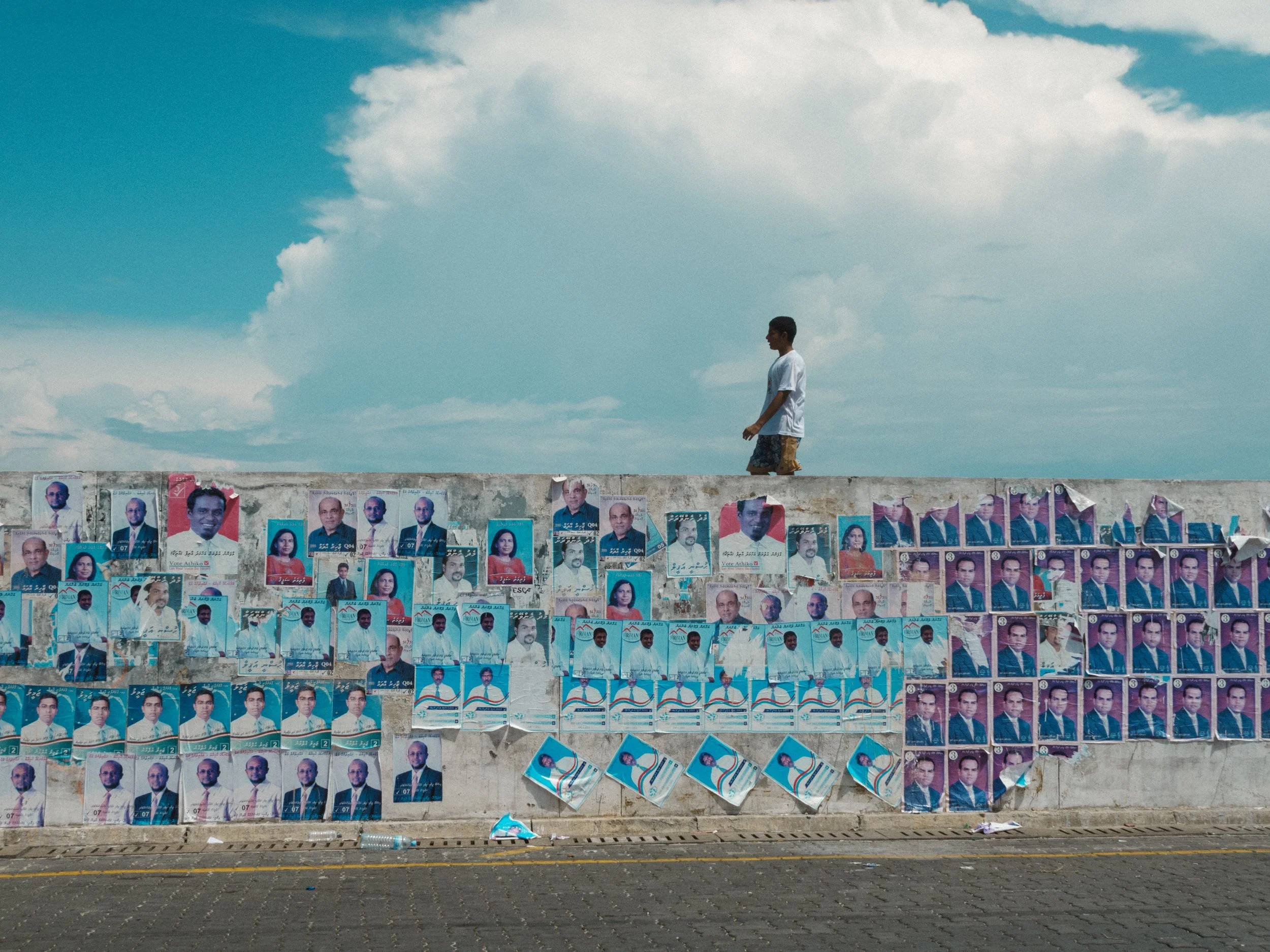5 sociological concepts that every Maldivian should know
05. Structure & Agency
“In the social sciences there is a standing debate over the primacy ofstructure or agency in shaping human behavior. Structure is the recurrent patterned arrangements which influence or limit the choices and opportunities available.[1] Agency is the capacity of individuals to act independently and to make their own free choices.[1] The structure versus agency debate may be understood as an issue of socializationagainst autonomy in determining whether an individual acts as a free agent or in a manner dictated by social structure.”
Maldivian Example :
During Maumoon's dictatorship (1978 - 2008), one of the structures that shaped our behavior can be defined as his authoritarian regime. Agency was severely limited in the way that criticizing his regime, even though it was not technically illegal, would still land you in a lot of trouble. As such freedom of press was severely controlled. This is evident in the way that all newspapers had to tow the government line and in how the state broadcaster TVM (Television Maldives) was the only local television station to allow to air for almost the entirety of his dictatorship.
The legacy of Maumoon's dictatorship is clear in the insistence by most Maldivians that the Maldives is "100% Muslim". This is maintained by the Maldivian constitution (the structure) and how it restricts the freedom of consciousness (in other words the agency) of Maldivians by stating that all citizens are required to be Muslims .
How is this useful practically though? Well for instance one could analyse the influence of structure and agency on the suicide of Ismail Mohamed Didi, a 25 year old atheist who committed suicide after being refused asylum. What structures of Maldivian society drove him to the decision to take his life? Was his dramatic death, hanging himself off the airport control tower of a nation so reliant on tourists, a final scream demonstrating his autonomy?
04. Dramaturgy
"In dramaturgical sociology it is argued that the elements of human interactions are dependent upon time, place, and audience. In other words, to Goffman, the self is a sense of who one is, a dramatic effect emerging from the immediate scene being presented.[3] Goffman forms a theatrical metaphor in defining the method in which one human being presents itself to another based on cultural values, norms, and beliefs. Performances can have disruptions (actors are aware of such), but most are successful. The goal of this presentation of self is acceptance from the audience through carefully conducted performance. If the actor succeeds, the audience will view the actor as he or she wants to be viewed.[4] "
Maldivian Example:
Maldivian celebrity Ali Rameez, singing with his band before he transformed himself into an extremist preacher. He now appears to run a sizable network of radicals and is involved with indoctrinating the public on a daily basis.
Consider politicians, religious scholars, the MNDF and the police. They are all wearing their own uniforms and when they wear this uniform, they act in a certain way. Politicians wear the uniform of suits and ties and go to great lengths to appear "professional". A politician would not wear a mundu to parliament as this would clash with the image they are trying to present. Similarly, religious scholars also put considerable effort into maintaining their appearance. This is apparent to the extent that you can even somewhat discern the sect the preacher is affiliated with through their appearance. A salafi preacher for instance, would almost never take to the stage without his beard or rolled up trousers . As such, politicians and preachers, when they interact with the public, put on a performance. The way they speak with the public will not be the same way that they speak with their peers and it will not be the same as the way they speak to their families. This is how you get alcohol drinking politicians and adulterous preachers giving incendiary speeches about how natural events such as the tsunami occurred because of a lack of morals on our behalf.
This is of course not limited to just people of a certain profession but to everyone; except perhaps a hermit living by themselves. Simply consider how your parents act around you and then how they act around themselves, or how you act around your parents compared to how you act around your close friends .
03. Labelling Theory
"Labeling theory is the theory of how the self-identity and behavior of individuals may be determined or influenced by the terms used to describe or classify them. It is associated with the concepts of self-fulfilling prophecy and stereotyping. Labeling theory holds that deviance is not inherent to an act, but instead focuses on the tendency of majorities to negatively label minorities or those seen as deviant from standard cultural norms.[1] The theory was prominent during the 1960s and 1970s, and some modified versions of the theory have developed and are still currently popular. A stigma is defined as a powerfully negative label that changes a person's self-concept and social identity.[2]"
Maldivian example:
Are you from the MDP? A yellow person? According to the PPM you must be a ganja smoking alcoholic!
Are you from the PPM? A pink (or is it magenta?) person? According to the MDP you are a brainwashed drone incapable of thinking for yourself.
Are you an atheist? According to the MDP and PPM you are a nasty Islamophobe funded by zionists and you're probably addicted to heroin too.
Are you a salafi? According to the atheists you are a brainwashed drone incapable of thinking for yourself.
Are you a police officer? According to almost everyone in the Maldives you're a brainwashed drone incapable of thinking for yourself that has no sincere intent of even trying to adhere to the motto of "protect and serve".
Are you not straight? According to almost everyone in the Maldives you're probably having sex with animals too.
Are you a drug addict? According to almost everyone in the Maldives you're a lost cause and a waste of oxygen.
With this last example, think about the effects this stigma would have on such a person in terms of getting out of the situation that led them to the addiction in the first place. Do you think they would see the error of their ways or would their addiction worsen as they attempted to ease the pain of further ostracization? This might also explain why so many people from Maldivian minorities (they themselves being severely ostracized ) appear to also suffer from some kind of drug addiction.
This can also apply to members of Maldivian gangs who are often discriminated against and stereotyped by using the term "partey(s)". A person joins such a gang because society has rejected them, because they find acceptance within that community; do you honestly think rejecting them further is the solution to get people out of those situations?
02. Social constructionism
"Social constructionism or the social construction of reality (also social concept) is a theory of knowledge in sociology and that examines the development of jointly constructed understandings of the world. It assumes that understanding, significance, and meaning are developed not separately within the individual, but in coordination with other human beings. The elements most important to the theory are (1) the assumption that human beings rationalize their experience by creating a model of the social world and how it functions and (2) that language is the most essential system through which humans construct reality.[1]"
Maldivian example:
What is the difference between a "raajje' therey meehaa" (literally - someone from within the kingdom, but often used as a derogatory term in the way someone might call someone a "country bumpkin" ) and a "Male' meehaa" (literally - someone from the capital city of Male', but often used as a derogatory term in the way someone might call someone a "city slicker")?
The differences are entirely constructed by society and it is maintained by several structures of Maldivian society; including the language itself which is divided into several levels of "politeness" and "sacredness" depending purely on class.
The same can be said for our performances of gender. Consider our constructions of gender in terms of our change of garments from the past to those of today. From the libaas and feyli to either the Western garbs of globalisation or the Arabian garbs of religious indoctrination. At the moment many people believe that women are somehow deficient in their capacity to lead and use religious justifications to make arguments against the idea that a woman may become the leader of a nation. As Maldivian society progresses, these ideas will be left by the wayside; but it doesn't mean that women suddenly became inherently more or less capable, it simply means that our perceptions around the idea have changed.
01. McDonaldisation
Ritzer highlighted four primary components of McDonaldization:
Efficiency – the optimal method for accomplishing a task. In this context, Ritzer has a very specific meaning of "efficiency". In the example of McDonald's customers, it is the fastest way to get from being hungry to being full. Efficiency in McDonaldization means that every aspect of the organization is geared toward the minimization of time.[3]
Calculability – objective should be quantifiable (e.g., sales) rather than subjective (e.g., taste). McDonaldization developed the notion that quantity equals quality, and that a large amount of product delivered to the customer in a short amount of time is the same as a high quality product. This allows people to quantify how much they're getting versus how much they’re paying. Organizations want consumers to believe that they are getting a large amount of product for not a lot of money. Workers in these organizations are judged by how fast they are instead of the quality of work they do.[3]
Predictability – standardized and uniform services. "Predictability" means that no matter where a person goes, they will receive the same service and receive the same product every time when interacting with the McDonaldized organization. This also applies to the workers in those organizations. Their tasks are highly repetitive, highly routine, and predictable.[3]
Control – standardized and uniform employees, replacement of human by non-human technologies
With these four principles of the fast food industry, a strategy which is rational within a narrow scope can lead to outcomes that are harmful or irrational. As these processes spread to other parts of society, modern society’s new social and cultural characteristics are created. For example, as McDonald’s enters a country and consumer patterns are unified, cultural hybridization occurs.
Maldivian example:
What would make the Maldives a perfect luxury tourist destination? The subtraction of the local population of course. But until that day, drones will have to do. It will be a very uninteresting society, but it will be absolute perfection in terms of providing a predictable service. For this one I'd like you, if you'd please, to think about this one for yourselves a bit. Where do you think the Maldives is truly heading? Do you think enough is being done to preserve our history and culture - especially it's ancient past? Do you think the Maldivian society elevates an individual to be all they can be, or does it mould a person for subservience?
Note: All of the examples I have provided are very basic and might not even be that accurate in terms of the broader theories involved. Do not listen to anyone expecting easy answers about any of these things. As with everything else I highly suggest you do your own independent research and come to your own conclusions.













